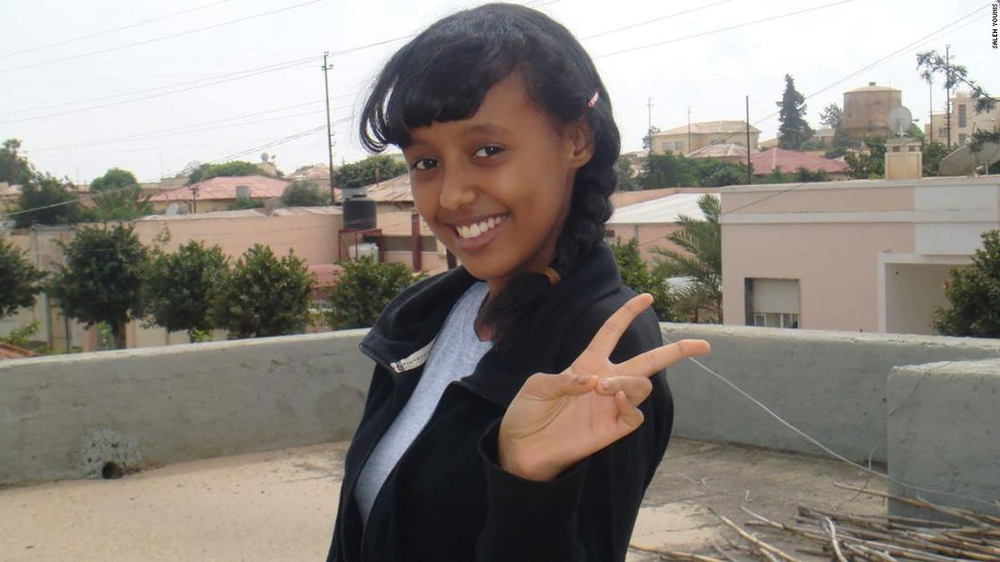She was just 15 years old when she was imprisoned. That was in 2012. Today, a little over eight years later, no one has heard from or seen Ciham Ali Ahmed since she was detained by Eritrean security forces while trying to leave the country. The Eritrean-American citizen has never been charged or convicted of any crime, but her family does not know where she is or what has happened to her since. In April of 2019, the Human Rights Watch reported that Ciham has been held in incommunicado detention for over six years, spending her 22nd birthday (and now presumably her 23rd birthday) behind bars.

Born in Los Angeles to Eritrean parents, Ali Adbu and Tsigereda Tsae’da, Ciham relocated to Eritrea’s capital Asmara with her family so her father could take a position as a government official under President Isaias Afwerki. Ali went on to become the country’s information minister, but fled the country in 2012 in fear for his life as the President’s rule became increasingly autocratic. Shortly after he left Ciham was arrested on December 8, 2012 while trying to cross the border into Sudan. Her father was attempting to arrange for smugglers to get her out of the country because he feared that the regime would take action against her as retribution for his defection or that she would face indefinite conscription, serving in Eritrea’s military.
The young population in Eritrea are subjected to a mandatory 18-month period of national service that for many, extends for years. A Human Rights Watch report from 2017 stated that “physical abuse, including torture” occurs frequently for people taking part in national service, and “so does forced domestic servitude and sexual violence by commanders against female conscripts.” As a result, young people in Eritrea are faced with either a lengthy conscription or heading on a dangerous journey out of the country to reach Europe.
“By holding Ciham Ali incommunicado from the age of 15, the government has effectively disappeared her,” said Felix Horne, senior Africa researcher at Human Rights Watch. “The release of Ciham and all of Eritrea’s political prisoners would send a clear message to the international community that the country’s leaders are embarking on a new path of increased respect for human rights.”
Diaspora groups like One Day Seyoum have been drawing attention to her plight with social media campaigns such as #happybirthdayciham and #purpleforciham. However, thus far the government has turned a deaf ear to calls requesting the release of many unjustly detained Eritreans.
Eritrea is the most censored country in the world and arbitrary and indefinite detention is the norm. Eritreans who criticize or question the government have been punished without trial or means of appeal. Suspicion can be enough to warrant arrest, and prisoners are often not informed of what crime they committed. Torture in captivity is also a major concern. Often described as the “North Korea of Africa,” Eritrea has never had a national election; there is no free press and citizens are not allowed to leave without an exit visa issued by the government.

Although Ciham is a US citizen, US officials told Voice of America that Eritrea has not provided them with information about her condition, and does not acknowledge that she is a US citizen. It remains unclear whether she is alive or dead. Incarceration is often incommunicado in Eritrea, and relatives are not given the whereabouts of a prisoner, let alone visitation rights. Family members have told Human Rights Watch about relatives who disappeared for years until their bodies were returned with no explanation. They said that they were warned not to ask questions and directed not to conduct an autopsy.
The peace agreement with Ethiopia in July of 2018 brought hope that Eritrea would usher in a new era of reform. Isaias Afwerki had long used the ongoing standoff with Ethiopia, sparked by the 1998 border war, to justify repression and indefinite military service. Sadly, since that peace deal, little has changed and thousands of political prisoners remain in jail.
Ciham’s family have made desperate attempts to find out what happened to her since her arrest. “Every time we have tried to find out where she is, the consistent message is: her case is being personally handled by the President and nobody knows anything about it. She just disappeared,” Saleh Younis, Ciham’s uncle, told CNN. Her father wrote in an affidavit that he had tried to negotiate to get his daughter out of Eritrea after he had fled when he found out his life was in danger. Ciham’s parents described their memories of her in a statement given to Younis.
“Ciham was always smiling and loved to surprise people by giving gifts,” they wrote. “She was so caring and compassionate, especially when she sees poor people. For example, she was giving her school lunch for one year to the beggar who was sitting at the doorstep of the school. Her dream was to be a world-renowned designer,” the statement added. They wrote that their daughter loved reggae music and was a great swimmer who loved to paint and spoke fluent English and Italian.
For ways to help and get involved visit One Day Seyoum, a youth led organization campaigning to end the human rights abuses committed against Eritrean people and supporting Eritrean refugees worldwide.
Free Ciham.

Powered by WPeMatico


